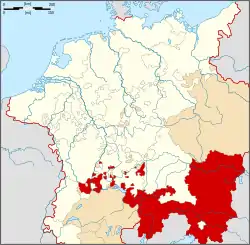Austrian Circle
The Austrian Circle (German: Österreichischer Reichskreis) was an Imperial Circle of the Holy Roman Empire. It was one of the four Imperial Circles created by decree after the 1512 Diet at Cologne, twelve years after the original six Circles were established in the course of the Imperial Reform. It roughly corresponds to present-day Austria (except for Salzburg and Burgenland), Slovenia, and the Trentino-Alto Adige/Südtirol and Venezia Giulia regions of Northern Italy, but also comprised the Further Austrian territories in the former Swabian stem duchy.
| Austrian Circle Österreichischer Reichskreis | |
|---|---|
| |
| 1512–1806 | |
 The Austrian Circle as at the beginning of the 16th century within the Holy Roman Empire | |
| History | |
• Established | 1512 |
• Disestablished | 1806 |
| Today part of | |
Organisation
The Austrian Circle was largely coterminous with the "Hereditary Lands" (Erblande) of the House of Habsburg, dominated by the Archduchy of Austria. Beside the Habsburg lands, it included the Prince-Bishoprics of Trent and Brixen, which, however, were largely ruled within the Habsburg lands of Tyrol.
The Circle's territory was again enlarged with the acquisition of the Bavarian Innviertel according to the 1779 Treaty of Teschen, as well as the Electorate of Salzburg and the Berchtesgaden Provostry by the German mediatisation in 1803. Nevertheless, the Austrian Circle was dissolved when Emperor Francis II resigned on 6 August 1806.
Composition
The circle was made up of the following states:
| Name | Type of entity | Comments |
|---|---|---|
| Bailiwick | Established about 1260, an administrative grouping of lands held by the Teutonic Knights in Tyrol | |
| Archduchy | March of Austria established in 976 by Emperor Otto II, raised to duchy by Emperor Frederick I Barbarossa in 1156, to Habsburg in 1278, self-bestowed "Archduchy" since 1358 | |
| Bailiwick | An administrative grouping of lands held by the Teutonic Order in Austria | |
| Prince-Bishopric | Established in 1027 by Emperor Conrad II, Prince-Bishopric since 1179 | |
| Duchy | Established in 976 by Emperor Otto II, held by the Archdukes of Austria since 1457, part of Inner Austria 1564–1619 | |
| Duchy | March of Carniola established in 1040 by Emperor Henry III, raised to duchy in 1364, held by the Archdukes of Austria since 1457, part of Inner Austria 1564–1619 | |
| Prince-Bishopric | Established in the 4th century, prince-bishopric since 1170, territory held by the League of God's House since 1367 | |
| County | Separated from the Patriarchate of Aquileia about 1127, held by the Archdukes of Austria from 1500, part of Inner Austria 1564-1619, merged into Gorizia and Gradisca in 1747 | |
| March | Established in 1040 by Emperor Henry III, major part to Venice in 1291, remaining territory around Pazin (Mitterburg) to Gorizia, held by the Archdukes of Austria since 1374 | |
| Duchy | March of Styria established about 970 by Emperor Otto I, raised to a duchy in 1180, held by the Dukes of Austria since 1192, part of Inner Austria 1564-1619 | |
| Lordship | Held by the Archdukes of Austria since 1464 | |
| Prince-Bishopric | Established in 1027 by Emperor Conrad II | |
| City | Held by the Archdukes of Austria since 1382 | |
| County | Established about 1140, held by the Archdukes of Austria since 1363, raised to "Princely County" in 1504, to Further Austria 1564-1665 |
-en.png.webp)